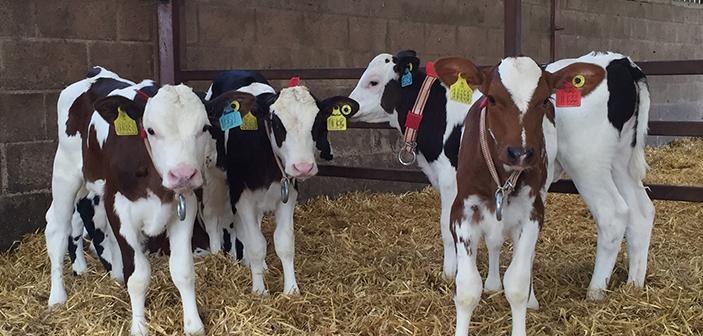More than 80% (83%) of UK dairy farmers see investment in improved genetics, genomics, nutrition and vaccination as being important to producing better quality heifer replacements so that these animals have a more productive life when they enter the adult milking herd.
That’s the headline finding from the Herd Futures survey – organised collaboratively by Cogent UK, MSD Animal Health and Volac – to gain feedback on how UK dairy farmers see the path to a more sustainable future. Nearly 250 (247) UK dairy farmers completed the survey during the spring of 2021.
When thinking about the future of their herd and, in particular, their youngstock rearing system, farmers were asked to rank the areas where they will be prioritising focus and investment over the next five years.
Colostrum management emerged as the number one priority, closely followed by investment in better genetics, facilities and farm equipment. Improved pre-weaning calf nutrition and better use of vaccines were also recognised as important.
It seems farmers are looking to agribusinesses too to help with the overall farm sustainability challenge. When asked how farm advisers can best support their drive for better youngstock productivity, improving colostrum management and calf nutrition were second only to preventing disease problems.
“Farmers are clearly looking for help from the agri-supply trade, and businesses like Cogent UK, MSD Animal Health and Volac can offer enormous value. We all have our particular areas of focus and farmers can draw on a wealth of expertise, as well as the proven inputs needed to produce better quality heifers,” said Ben Hogg, national business development manager with Cogent UK.
Mr Hogg stressed that it was important to invest wisely to produce the best quality heifer calf you can – and to do so as efficiently as possible.
“Importantly, farmers are increasingly recognising the value of genomics to help achieve this goal. And there was wholehearted agreement (amongst 90% of the sample) that being able to guarantee a greater than 95% chance of a heifer calf through the use of sexed semen will be a real ‘game-changer’.
“We are also close to being able to help farmers measure more accurately the efficiency with which dairy herd females are able to utilise their feed; 94% of the survey respondents see this as being important over the next five years,” said Mr Hogg.
Turning to pre-weaning calf nutrition, Dr Jessica Cooke from Volac said that nearly 50% of farmers now believe feeding whole milk to calves is a health risk and a lost sale.
“Progress is still needed in this respect, but many more dairy farmers now recognise the efficiency, consistency, biosecurity and convenience benefits of feeding a calf milk formula. Mixed accurately and fed in sufficient quantity, modern milk formulas must encourage better solid feed intake and prime heifers for a productive milking life,” she said.
Dr Cooke added that when it comes to making their dairy businesses more sustainable, farmers also like the idea of ‘buying British’ pre-weaned calf nutrition.
“More than half the sample (51%) strongly agreed and 33% agreed that feeding a calf milk replacer made in Britain from milk produced on British farms would be helpful for ensuring the future sustainability of their dairy herd.
“About 10% of the milk produced by the national herd is taken up by cheese manufacturers. Volac then buys back 1.1 billion litres a year of the whey co-product produced when cheese is made from British farmers’ milk, turning it into the valuable concentrated milk protein raw material (Imunopro®) that we use in our calf milk formulas,” she said.
When it came to feedback on significant calf health issues, Rob Simpson from MSD Animal Health said it was reassuring that UK dairy farmers either strongly agree (78%) or agree (21%) that preventing disease in their youngstock will lead to better later life productivity.
“Use of vaccines is important here, particularly for control of the two key diseases impacting on youngstock health and productivity: pneumonia and scours. And we are pleased that 73% of the survey respondents now see vaccination as a critical part of disease prevention for these two costly diseases. But with current vaccine market penetration rates at only 17% for management of infectious calf scours and 36% for pneumonia control, the industry still has some way to go here,” he said.
Mr Simpson highlighted the use of thoracic ultrasound scanning (TUS) of calf lungs as an important educator in this respect.
“We think that if vets are able to somehow show their farmer clients hidden, productivity-limiting lung damage as a result of pneumonia – even before a calf shows visible signs of any disease – this will definitely foster better disease management education. And farmers seem to agree: 79% said that this veterinary support would certainly help them focus more on pneumonia control,” he said.
He added that 79% of UK dairy farmers see their vet as a key adviser when it comes to youngstock rearing advice, explaining that MSD Animal Health is currently investing in a wide range of tools – alongside TUS of calf lungs – to help vets engage more proactively with farmers over youngstock health issues.
“We know that if we can help encourage better discussions on UK dairy farms – and be able to show youngstock rearers the tangible value of better disease prevention practices – these Herd Futures survey findings clearly show farmers will be willing to listen when it comes to meeting the future sustainability challenge.”


